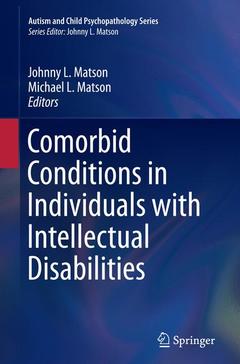Description
Comorbid Conditions in Individuals with Intellectual Disabilities, 2015
Autism and Child Psychopathology Series
Coordinators: Matson Johnny L., Matson Michael L.
Language: English
Subjects for Comorbid Conditions in Individuals with Intellectual...:
Keywords
ADHD comorbid with intellectual disability; ASD and intellectual disability; Anxiety disorders comorbid with intellectual disability; Autism spectrum disorders and intellectual disability; Cerebral palsy and intellectual disability; Challenging behaviors and intellectual disability; Dementia and intellectual disability; Depression comorbid with intellectual disability; Developmental coordination disorder and ID; Epilepsy and intellectual disability; Epilepsy comorbid with intellectual disability; Feeding d
Publication date: 10-2016
Support: Print on demand
Publication date: 11-2016
Support: Print on demand
Publication date: 06-2015
446 p. · 15.5x23.5 cm · Hardback
Description
/li>Contents
/li>Biography
/li>Comment
/li>
This comprehensive edited volume synthesizes the current state of research and practice in psychological, medical, and motor disorders as they affect individuals with intellectual disabilities (ID). It examines how these disorders exist across this population, sometimes confound diagnosis, and often affect individuals? quality of life. In addition, this book explores which treatments are effective for patients and points to future challenges.
Comorbid conditions featured include:
- Challenging behaviors.
- ADHD, autism, and other conditions present during early childhood.
- Anxiety, depression, and schizophrenia.
- Balance and gait problems.
- Cerebral palsy.
- Medical conditions common to persons with ID, such as epilepsy, obesity, and chronic pain.
Comorbid Conditions in Individuals with Intellectual Disabilities is an essential resource for researchers, clinicians/professionals, and graduate students in clinical child, school, and developmental psychology, child and adolescent psychiatry, and social work as well as rehabilitation medicine/therapy, behavioral therapy, pediatrics, and educational psychology.
Part I: Overview.- Chapter 1. Scope and Prevalence of the Problem.- Part II: Psychological Disorders.- Chapter 2. Challenging Behaviors (CB).- Chapter 3. Psychopathology: ADHD, Autism, and Other Conditions Present in Early Childhood.- Chapter 4. Psychopathology: Anxiety, Depression and Schizophrenia.- Chapter 5. Feeding Disorders.- Chapter 6. Sleep Disorders.- Part III: Medical Disorders.- Chapter 7. Epilepsy.- Chapter 8. Dementia.- Chapter 9. Obesity.- Chapter 10. Pain.- Part IV: Motor Movement Problems.- Chapter 11. Balance and Gait.- Chapter 12. Overview of Cerebral Palsy (CP).- Chapter 13. The Relationship of Cerebral Palsy Comorbid Conditions with Participation and Quality of Life.- Chapter 14. Current Status and Future Directions.
Johnny L. Matson, Ph.D., is Professor and Distinguished Research Master and Director of Clinical Training in the Department of Psychology at Louisiana State University, Baton Rouge, LA, U.S.A. He has also previously held a professorship in psychiatry and clinical psychology at the University of Pittsburgh. He is the author of more than 800 publications including 41 books. He also serves as Founding Editor-in-Chief of three journals; Research in Developmental Disabilities (Elsevier), Research in Autism Spectrum Disorders (Elsevier), and Review Journal of Autism and Developmental Disorders (Springer).
Michael L. Matson, M.S.W. received his master’s degree in social work from Tulane University and his bachelor’s degree in psychology from Louisiana State University. He works in the research and training program of Disability Consultants, LLC. Michael is the Managing Editor of the journals Research in Developmental Disabilities (Elsevier), Research in Autism Spectrum Disorders (Elsevier) and Review Journal of Autism and Developmental Disorders. He is the author of four books and 15 journal articles.
Reviews the history and scope of the intellectual disability field
Examines major psychological, medical, and motor movement disorders and conditions comorbid in children with ID
Discusses tools needed to study ID and comorbid conditions effectively
Reviews a broad research literature base dedicated to ID
Uses a conceptual diagnostic model to delineate how various IDs and mental health and medical conditions intersect
Includes supplementary material: sn.pub/extras




